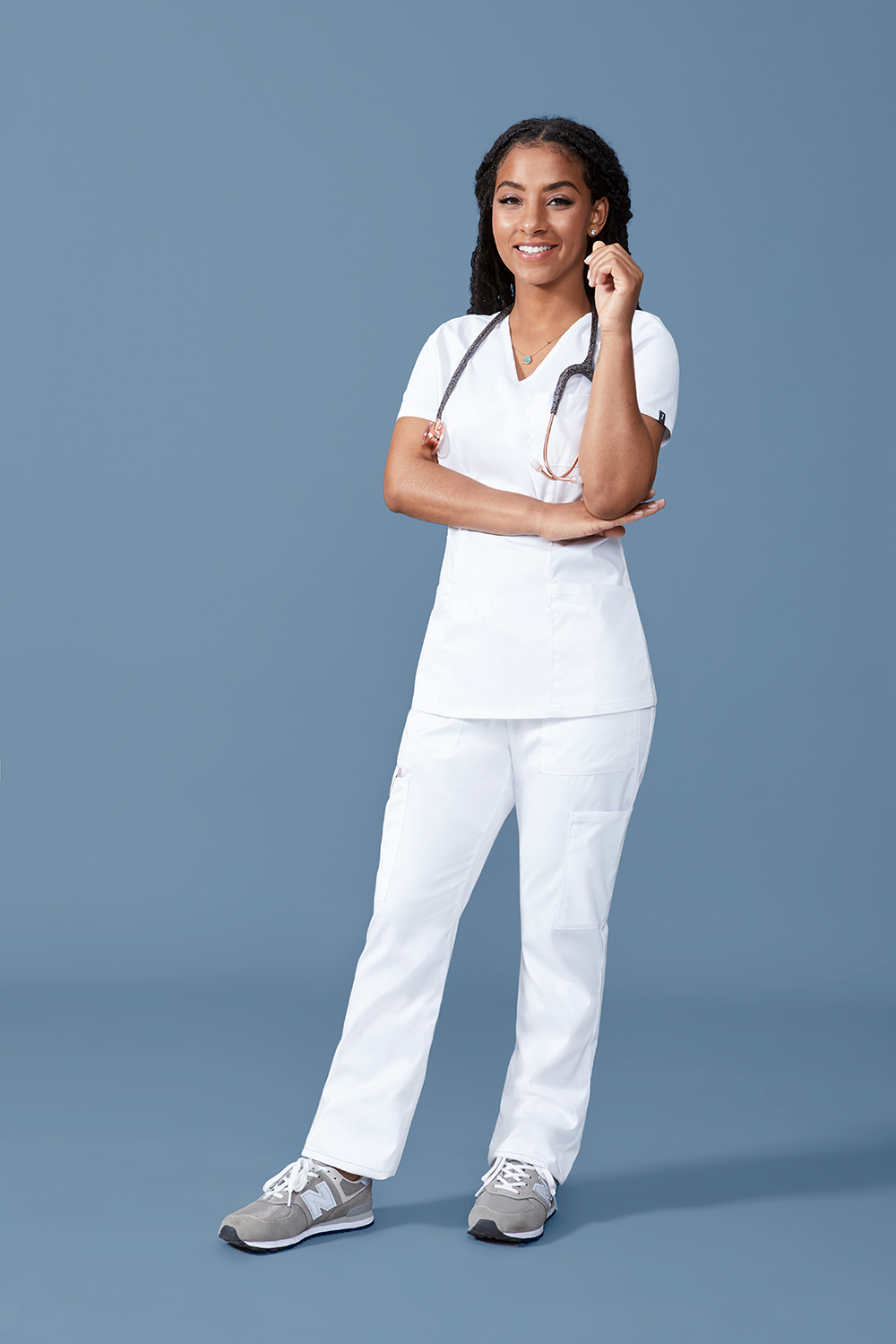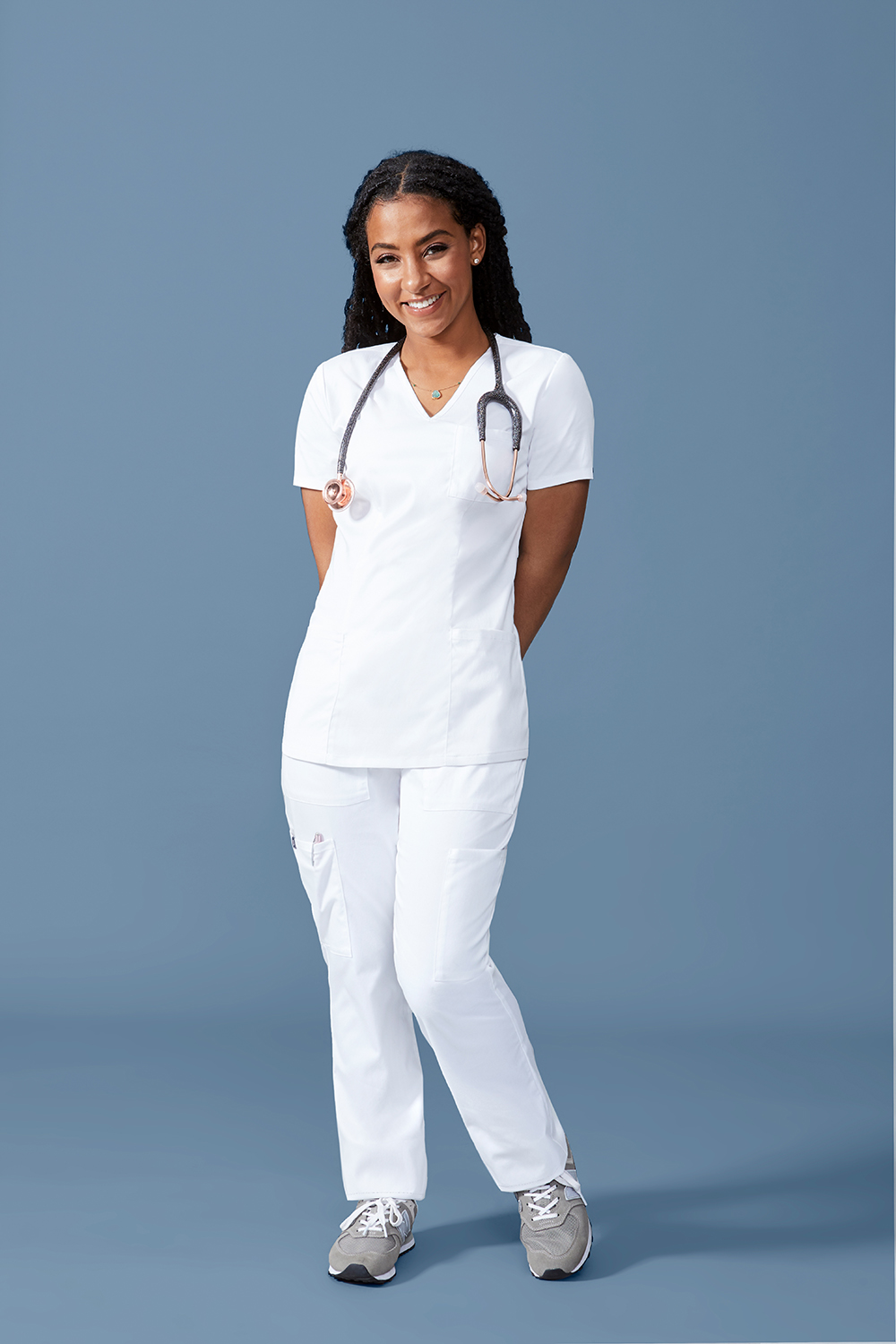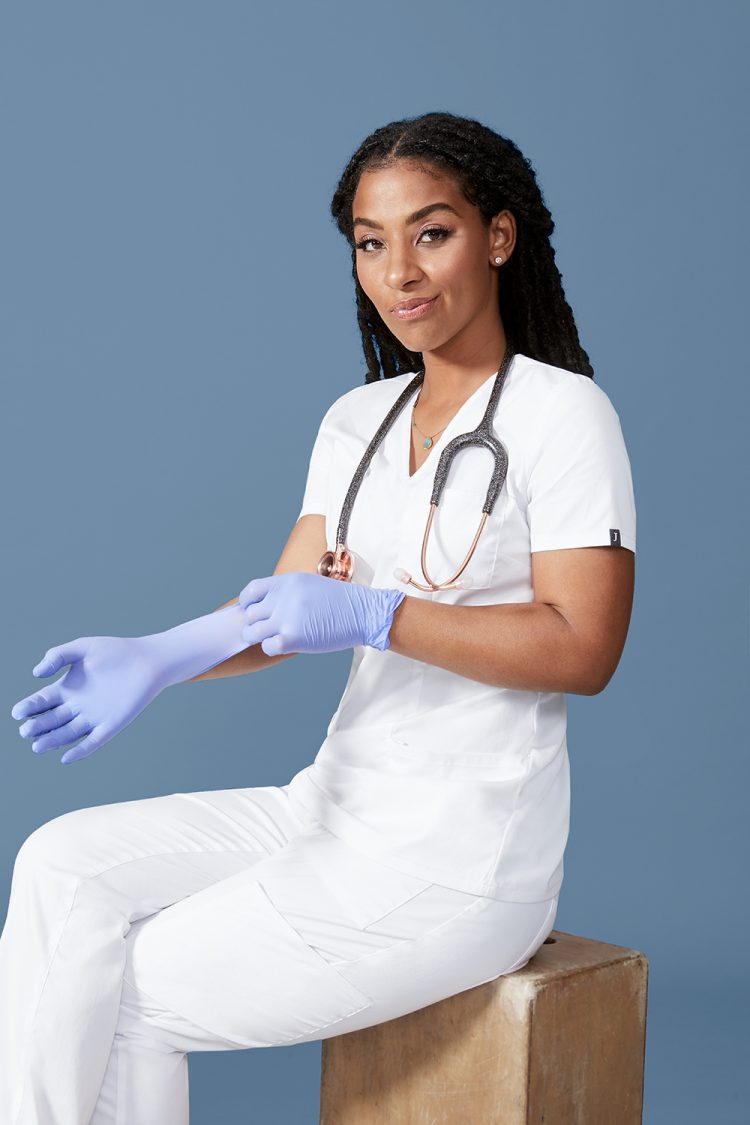
Did you know we featured real medical professionals in our Classics campaign? Now we’re giving you the opportunity to learn more about each of these amazing individuals. Get to know Monique D.
First off, tell us a little about you.
I’m originally from Philadelphia and come from pretty humble beginnings. I grew up with my mom and dad—they’re divorced but best friends. I left home at 17 and I’ve been a nomad ever since. I went to an HBCU (Historically Black College), which provides culture and instills a lot of pride within the African American community. I’m a travel nurse and have done 8 travel jobs all over the United States, from Atlanta to San Francisco to Los Angeles.
Why did you become a nurse?
It wasn’t an angel who came to me in my sleep. I wanted a career that would keep me gainfully employed for the rest of my life, and would provide sustainability for me and my family when I got older.
You’re a travel nurse. Can you tell us more about what that’s like?
As a travel nurse, you sign up through an agency. You don’t have to work 365 days a year. You have anywhere between 4-13 week contracts, and you get to take really long breaks.
You get very little training (3-4 days) and you’re expected to function as a high level staff member. My name only gets submitted to certain institutions. I try to work in teaching facilities. The physicians and nurses are on the same level—it’s an interdisciplinary team and we work together for the best of the patient. A lot of our doctors are residents, so they rely on nurses for patient insight. I’m treated as a team member versus as a subordinate.
I’ve worked at USC, UCLA and UCSF, and I’m planning on going to NYU, Columbia or Cornell. I try to work at institutions that provide high level care for their patients. If I’m going to take care of people, I want to do it with the best resources possible.
What does a typical shift look like for you (if there even is one)?
I’m a certified critical care nurse and I work in the float pool, which means I go to any of the ICUs or anywhere in the hospital except surgery. My favorite specialty is neurosurgical care, because it’s a cleaner service. Neurosurgeons tend to be well versed and are very much a part of their patients’ care. It’s also one of the rare areas of critical care where I’m able to send my patient home.
I work the night shift and normally assume care for 2 patients—we have ratios in California. They tend to be fairly sick, so someone needs to watch them at all times. I get a report from another nurse, assess the patient at their bedside, and then I go through a head-to-toe assessment—I physically look at their skin, lines, drains and airways. At least 1 patient is generally intubated and on a few life sustaining medications. I look over labs and at anything pending and always make sure the patient has a couple things ordered—labs for the morning, chest X-ray, PC and OT. If there’s any confusion, I ask for a psych consult or chaplain services. I turn them every 2 hours (many are comatose). I look for the 3 Ps—pain, potty, position.
Around 4am is bath time. That’s my time with my patients. I’m very into grooming—I love skin and bath products. I clean them up, wash their hair, make sure my black women have bonnets, change linens and dressings, wipe down the walls and clean the room. I start to remove everything from the room that the patient is no longer using. I like to declutter the space. These are my personal touches to make the patient feel better. I play soothing music and involve the patients as much as possible. Afterward, I always get their phone or a mirror and tell them how amazing they look.
I like to do little things to make my patients feel human. Even when I’m doing a neuro assessment, I try to make it fun. It’s nice to have a laugh. Imagine not having a hug or a laugh or looking at yourself every day—that would be really strange. I personalize their care. I would like someone to do that for me.
I look at it this way. I don’t have to be here—I’m choosing to be here. Let me do that with oomph, pride and flavor.

How would your coworkers describe you?
- Very bubbly. I call my patients princess, prince and lovey.
- I’m always open to learn and I’m not afraid to ask for help.
- I’m a delegator. I would rather spend my time with my patients than running to get blood or calling the lab.
- I don’t let people get the best of me or bother me.
- I’m very into establishing boundaries because I love and value myself. I don’t let other people talk to me in any way I wouldn’t talk to myself.
We know “a day in the life of a nurse” is challenging. What keeps you going back?
It gets hard. Some days you have patients yell at you and call you stupid or ugly and you’re trying to clean up their bodily fluids. Without the work I do, something wouldn’t go right. Knowing my job is valuable, important, it matters, it makes me do it with pride. I serve a very valuable part in this universe we live in, and I believe in integrity every single day. You have to believe in a sense of higher power. You have to have something to speak to that and that keeps you balanced.
I don’t think it’s fair to assume you’ll be a punching bag. I’m not going to be subject to that kind of abuse because I love myself, and they don’t need to talk to me like that. I set up boundaries with patients early on. I approach it with the mindset that the person is fighting a battle that has nothing to do with me. If my patients are coherent enough, I let them know early on that I’m going to take really good care of them and they’ll have everything they need—but they have to respect me.
I’ve also been doing influencer work and motivational speaking, so nursing became more of a choice that I didn’t have to do for money. That made a big difference—I’m choosing to be here. The fact that I’m able to take long breaks keeps me from getting burned out. Or a patient will give me a lollipop and a card and I’ll cry. I choose to go back to it all the time because it’s an honorable thing to do.
What’s your advice to someone just starting out as a nurse?
As a nurse, you’re constantly a student. There are constantly new ways to learn and do things. I’m reliant on anyone who can teach me—my CNAs, patient care techs, LPNs, LDNs. I’m also constantly learning from patients about how they do their care—if they do certain things with their dressing changes, or how they get in and out of their wheelchair. Always be open to learning. And you don’t know anything on your first job.
- Don’t take anything personally. That doesn’t mean you can’t address issues or establish boundaries, but don’t bring it home with you or carry other people’s drama with you.
- Do your job. If you don’t like the way it’s done, be an advocate for your patients to seek change.
- We do really heavy work. Find an outlet. You need to do something—swim every day, run, do something else.
- Don’t be afraid to go to therapy. Sitting down talking to a trained licensed professional, boxing, going on a hike and yelling—whatever it is, find some source of that.
- Nobody teaches you about self care in nursing school. Take care of yourself in whatever way that means to you. I write out my mantra every day. That makes a big difference for my sanity.
- You’re holding a lot with you. You’re allowed to take a moment. You will cry at some point in your career. I’ve cried 5 times in my 8 years as a nurse. You need to let it out. Do it in your car, write about it, release that emotion. Find a safe place where you can express yourself, breathe and let out that emotion.
- You’re not going to learn everything in one day. Why should you? You’re literally dealing with the human body. It’s going to be hard, but why would it not be? Nursing school teaches you how to pass your boards. Life teaches you how to be a nurse. I learned maybe 10 percent of what I know in nursing school. I learned almost everything I needed to know on my first job.

What’s one piece of medical advice you’d give to your younger self?
Don’t be afraid to speak up, even to higher levels, when something feels off with the patient. The worst thing that can happen is your ego can get bruised.
Do you have any regrets at work, or something you’d do over?
I wish I would have started taking care of myself sooner. In my younger years, I went to work and dealt with really sick people, and didn’t care for myself on a physical, emotional and spiritual level. I wish I would have realized that I had needs.
How do you spend your time when you’re not at work?
- I’ve been to 8 different countries completely alone, solo travel is very empowering for me. I felt if I was waiting for the right boyfriend or friends to go with me, I’d never go. My first solo trip was to Bali when I was 29. The flight was $400! I had to have a conversation with myself—Monique, you work on people’s brains. You can fly alone. I didn’t meet anyone on that trip, but the next trip was Amsterdam, Holland and the Netherlands, and I met many people. I met one of my best friends in Holland and we traveled through Italy last summer. It’s cool to meet people with a different point of view—it helps you understand your patients and other people better.
- Meeting friends in different spaces. They can offer me perspectives I don’t even know exist. I make it a hobby—I’m conscious about making friends I don’t have much in common with to learn from them.
In 2012, I started a job at Grady Memorial Hospital. I was 90 pounds and stressed out, I was making bad money but I felt like a rockstar. I would have 3 shifts and then all this free time. Instagram was a new platform, but I had a Twitter and MySpace following. I was always pretty good at social media, but it was because of my social activities and lifestyle. What if I put something valuable out there and shared my profession with people?
I searched for someone who looked like me who was a nurse. I felt that nurses who were young weren’t highly represented. The only representation was an older woman who was matronly, or Nurse Jackie. Either we were these slutty sexualized beings or I wouldn’t touch her and this is my grandma. I really wanted the world and women of color to understand that this was an outlet for them. Especially those who come from underprivileged areas—you can make really good money, you can travel the world, you can take care of other people.
I got on my iPhone 5 and did a YouTube video. I started sharing stories about being a nurse. I tried to do it from a positive experience because I noticed a lot of nurses were very cynical. I wanted to shed light on the profession. I was 26, and I was able to help people for a living. I would do little motivational minutes and people liked them. The more I gave of myself, the more transparent I was, that resonated with people. I felt like I was the anti-influencer because I was talking about my failures, breakups, my triumphs, the down points, meditation, taking a second to do nothing and eat cupcakes in bed. Telling people I don’t always feel okay and that’s okay. It really opened up my audience and helped them relate to me.
My goal was to make girls who looked like me understand it was something that was attainable to them. I think it makes a difference when you see someone who looks like you doing something you desire to do. It makes you feel that it’s attainable for you. I wanted a brown face out there. Some little brown girl is going to say, “She’s a nurse? I can be a nurse, too.”
In August 2018, I got really tired of talking about nursing all the time. I was managing 10 social media accounts and speaking all over the world. I wanted to tell people more about that. I left the bedside for 11 months, from March-December, to travel and do speaking engagements.
I decided to split my two brands. My nursing brand is theresilientnurse.com. I feature all different influencers-31 different brand ambassadors that are all different walks of life, shapes, colors and sizes. We feature a different guest blogger and story takeover every week.
@iamnursemo is about female empowerment and motivation—stepping outside of your comfort zone and creating the life you want.
You’re one of our team members for our new Classics collection. What do you think about these scrubs?
Classic is the best way to describe it. When I thought of classic, I thought it would be boxy, but it’s fitted and beautiful, with those nice little details that still remind you this is fashion, not medical apparel.
I like that this collection is for all. I love the way that it was shot, because it shows it was for everyone. I love that these scrubs are fashion because I’m a fashion girl. I’m in scrubs longer than I’m in any other attire—13 hours a day. Why not look hot! But not in a way that’s unprofessional. I love that I look clean.
How did it feel being part of this campaign?
I think Jaanuu captured the element of being a nurse—being powerful, strong, authentic and a medical professional. My big thing is inclusion. I’m very proud to be the color and race I am, from the cultural background I am. I’m really proud to be a black woman and I celebrate that. Jaanuu celebrated the things about me that I love.
Every person they had on board brought something really different. It was really great to do something I felt was something I would do myself. I would do it again a thousand times over. When I got the images, I felt like they highlighted me as well as their product. I can use these images for life—they represent ME.
Follow Monique: @iamnursemo

